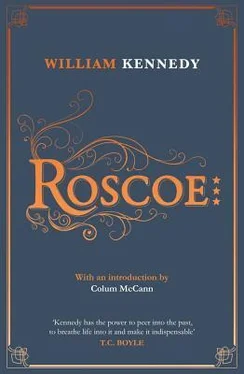“I think we avoided a civil war in the party. I’m glad I was there.”
“Glad? Arrested with whores? Your reputation is a shambles.”
“I haven’t had a reputation since I was seven years old, Alex. And if Patsy had arrested Bindy, there’s a very good chance one of them would now be dead.”
“Patsy wouldn’t have ordered that raid. He told me last night he just wanted to make a point. Ask him yourself.”
Roscoe nodded, understanding Patsy’s reversal of unbearable history. The man could not stand to be wrong. Situational truth. Roscoe understood also that Patsy’s new version of his Bindy plan downgraded Roscoe’s achievement. Nice going, Ros. What you did was miraculous, more or less, but not really necessary Now get off stage and stop making me look stupid.
“Roscoe, I know turning the tables on the raiders the way you did was brilliant, and I congratulate you. But people just don’t believe you were there only as a lawyer. You’ve got to reverse your image.”
“If they reverse my pain and fix my breathing, my image will take care of itself. Look, Alex, forget about me. I’m not important. Pay attention to your campaign.”
“I’ve got a rally and two radio speeches coming up.”
“Good. Take the limelight back from Cutie. The clown is stealing the show. Two days ago he turned up as Abe Lincoln. He read the Gettysburg Address and dedicated it to the Battle of the Bulge.”
Roscoe judged Alex’s aggressive tone as probably a learned response to living among redneck sergeants; also, he doesn’t want your arms around his mother. But what put an edge to this for Roscoe was Alex’s misreading of Patsy’s dissembling, and that virtuous worrying over Roscoe’s reputation; which gave his discontent another dimension.
Veronica brought Dr. Toussaint to Roscoe’s bedside, then she and Alex waited in the hallway during the examination. Roscoe’s internal bleeding had obviously continued, its buildup of pressure worsening the pain, his blood pressure dangerously low. “Into the hospital immediately, Roscoe,” Dr. Toussaint concluded.
“I’m not fighting it,” Roscoe said, “but I’m beginning to feel like that fellow with the wound that never heals.”
“There’s a lot of those fellows out there,” the doctor said.
“The brotherhood of the open wound,” Roscoe said.
The doctor sent Alex for the ambulance attendants, a burly pair who lifted Roscoe out of bed onto the stretcher, twisting his pain.
“I’ll follow Roscoe to the hospital, get him settled in,” Veronica said, which did not thrill Alex.
Roscoe Muses on Politics and Death While Having His Heart Cut Out
It’s true, Rozzie, we’re going to slice you from hell to breakfast and then saw your chest, crank open your sternum like an oyster, go in and get at that heart of yours, and slit a corner of the sack it comes in to let loose all the dammed-up blood. We’ll sew up any little nick to your heart where you hurt yourself, suck out the old clotty stuff, and let any fresh blood ooze out for a while. Can’t sew up the sack or we’d just be damming it back up and have to go in again. So we leave it open and it’ll either figure out how to fix itself or it won’t. Then we sew up with catgut wherever we cut you going in, we wire that sternum back together, stitch up the chest and there you have it, another one of the old thor acotomies, another one of the old pericardiotomies. Your blood won’t leak no more and you’ll be good as new if you don’t die, always a possibility, this is not easy what we do, stuff can go wrong and we just might slit the heart wrong and set off a little arrhythmia, or you could have a stroke or a heart attack or a blood clot with the last word. But just maybe it’ll be sweet sailing, like on your favorite boat up at Tristano. Think about that boat.
Roscoe rarely dwelled on his own death: too many other things to think about. But now that he’s staring it down, is he as ready for it as Elisha was? Doubtful. Roscoe wants to get away but not that far, wants to make a move but is still asking questions: What didn’t he do that he should have? What did he do that he shouldn’t have? No, never mind that last question, Ros, we don’t have time. Keep in mind that if you die on the operating table you won’t have to protect Veronica anymore, won’t have to figure out Gilby and Pamela, or get Alex re-elected in a tough year, or decide why Elisha killed himself. No matter what logic you summon, Elisha’s suicide doesn’t make sense simply as the end of something. Roscoe remembers Elisha saying in a black moment that everything eventually comes to nothing. “That’s the secret you don’t tell the children,” he said, “and even if you did, they wouldn’t accept it.” But Roscoe now believes that Elisha, at the end, overruled his own conclusion on nothing. A suicidal getaway is usually flight from the unbearable, which wasn’t Elisha’s condition, was it? Or it’s a form of cowardly escape, or maybe delusory innocence descending; and Elisha was neither coward nor innocent, and rarely deluded. He was a cunning and courageous man with multiple reasons for everything he did, and he would not design his death on the basis of fear or insubstantiality Roscoe has almost convinced himself that Elisha, sliding into the inevitable, decided to do a bit of posthumous combat with the enemy, who was closing in. And who else would it be but Pamela and the hyenas she drags in her wake? And on whom could they close in? Not Elisha, who has slipped away on them; which leaves Veronica, Alex, Gilby.
The Candidate
The idea of Elisha’s making a cowardly getaway was absurd. You should have seen him when he really had enemies: when we ran him for governor. When we all lined up behind Patsy in 1919, nobody knew that so much would come of it. We loved the game and we were in on change. Al Smith was a key player then. Everybody in Albany knew Al, east side, west side, for he’d lived here on and off since Tammany first elected him to the Assembly in 1904. He went on to serve six terms and become Assembly Speaker, then Governor. When he ran for governor in ’22 and ’24, we saw to it that he won Albany with fat pluralities. After his ’26 victory, Al made Elisha Democratic State Committee chairman, and Eli roamed the state as advance man for Al’s presidential bandwagon. While Al ogled the White House, we ogled his chair in the Capitol, and our Mayor Goddard was a fine fit.
Goddard, a Baptist banker with great public appeal, had run up such impressive totals as mayor in ’21, ’23, and ’25 that people were saying he was unbeatable, a real candidate to succeed Al in ’28. Upstaters are always a long shot, but the front-runner, FDR, was out of the race, down in Warm Springs trying to regain use of his legs after his polio attack. Tammany Hall, under Charlie Murphy and then George Olvany, had always looked on us as upstate family, and so had John McCooey, the boss of Brooklyn Democrats. Their numbers dominated state Democratic conventions, and they were with us, so we truly had a chance to nominate Goddard for governor.
Mayor Goddard, Roscoe, and Elisha were always welcome at the Governor’s Mansion when Al lived there, but Patsy, who didn’t get along with Al, had never set foot in the place. As early as ’23, Al frowned on Patsy’s direct dealing in bootleg beer, and in ’27, as pressure mounted on Al to close down the Albany baseball pool, he asked Patsy and Roscoe to come to the Eagle Street Mansion for a private talk. Al was waiting for them on the veranda as they came up the steps. He pointed them to a prearranged pair of rocking chairs and sat in a third rocker, facing them.
“The Republicans are making noise about this pool again,” Al said. He was in shirtsleeves with arm garters, and he also wore a cigar. “And federal men are nosing around about the sale of plays across state lines.”
Читать дальше












